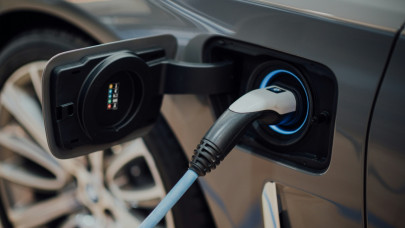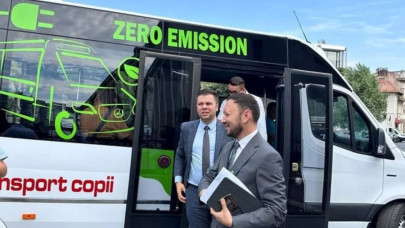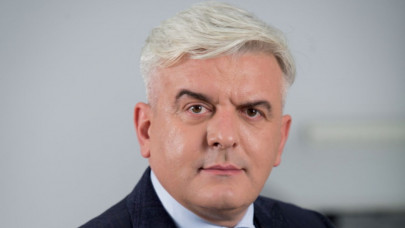Romania has set ambitious climate goals for 2030. What are the biggest challenges the Ministry of Environment faces in achieving these goals, and how are you overcoming them?
MMAP implements national climate change policy through programs and policies aimed at preventing and ensuring adaptation to the reality we all face. The development of irrigation systems and combating the effects of climate change through irrigation is a solution for an effect, not addressing the cause, but helping farmers and states ensure food production.
The only solution to master this phenomenon is the increase of forested areas. Also, the southern countries need to return to the balance that was destroyed by the disappearance of lands in the extra-Carpathian part of Romania. We have eight counties in the country with less than 10% forest land. There are still seven or eight that are below 15%. Balance needs to be recreated, and through the National Recovery and Resilience Plan (PNRR), we have funding for thousands of hectares, which will help restore this balance in certain areas.
We have sufficient funds to change the trend of reducing forested areas in these counties in particular and to restore balances. There is one billion allocated for this purpose - forest habitats, hundreds of millions to establish thousands of hectares of forest land, and we have a program that can concretely support the fight against climate change.
Waste management is a major challenge in Romania. What is the Ministry's strategy for increasing recycling rates and reducing reliance on landfills?
The Waste Management Component of the PNRR has a budget of over €1 billion for investments in voluntary deposit centers, digitized ecological islands, and recycling factories. Voluntary Deposit Centers (VDCs) - Establishing Voluntary Deposit Collection Centers funded by PNRR will catalyze the development of capacities for waste preparation for reuse and valorization to continue the process of compliance with circular economy principles.
We just launched a new tender for the acquisition of containers for equipping voluntary deposit collection centres. The estimated value for the 597 packages of containers required for equipping voluntary deposit collection centres is over 619.5 million lei, excluding VAT. The Administrative-Territorial Units are the investment beneficiaries, which will have the status of implementing and payment authorities within the projects.
VDCs will receive waste with high potential for reuse such as electrical and electronic equipment, furniture, carpets, mattresses, textiles, footwear, tyres, auto parts, etc. Not everything that is no longer used in a household needs to be thrown away. Many of these objects can be reused and find a new life. For this purpose, we are working on a series of legislative changes, including standards to allow and facilitate such approaches.
At the same time, we fully finance the establishment of digitized ecological islands, with a budget of €260 million, budget financing the operation of almost 14,000 digitized ecological islands. This subinvestment supports specific activities/actions for the establishment and equipping of digitized ecological islands (ensemble of containers) for the following separately collected waste streams: paper and cardboard waste, plastic and metal waste, glass waste, biodegradable waste, residual waste, specific actions for developing the necessary software platform for operating digitized ecological islands and data administrators, specific actions to promote investments, as well as to promote the "pay as you throw" principle.
By the end of 2024, PNRR targets include the operation of 250 voluntary deposit collection centres, 7 integrated voluntary deposit collection centres, and 7,000 ecological islands. The investments aim to expand the separate collection system predominantly in urban areas, in accordance with the provisions of national legislation and the Circular Economy Package (CEP).
How does the current Guarantee-Return System (GRS) look at the moment? Are you satisfied with how it has functioned so far? What aspects should be improved?
We have figures that break record after record: in December we had approximately 30,000 packages collected, in January we had 2.2 million packages, and today we already have over 18 million in February. This is mainly due to the population.
I dare to hope that we will exceed 20 million this month and the trend can only be a positive one. The Deposit-Return System works and we can hope that the way things are evolving, Romania will be one of the countries where recycling becomes a way of life. It is true that, as I said at the launch of the project, the system is far from perfect, and every day there are small problems that we remedy, we know them, and we are in dialogue with traders, whether they are large retailers or small shops, we are in permanent dialogue with producers and we are extremely optimistic because we have these good results.
In my opinion, for the Deposit-Return System to truly work, there is only one option, namely for all stakeholders - citizens, authorities, producers, or traders - to join this great dance of recycling, about which we have talked a lot, which is growing bigger day by day, and spinning faster and faster.
Do you believe Romanians will buy fewer electric cars with the reduction of the eco-voucher for Rabla Plus?
Rabla Plus will have a record budget of €201 million in 2024. Regarding the proposal to halve the amount granted for financing an electric car, we prefer to see the "bright side," namely that the budget of the Rabla Plus program will mean a double the number of electric cars to be purchased.
In other words, citizens will not automatically pay an extra €5,000 out of pocket because each merchant's policy could generate attractive solutions even with a voucher of €5,134, which, I believe, is not a small amount. I expect by the end of 2024, we will be able to say that we have exhausted this record budget of €201 million for Rabla Plus, a first for the program.
What are the Ministry's top environmental priorities for the next five years?
The European Union (EU) maintains rigorous environmental regulations, driven by global imperatives, particularly aimed at mitigating climate change primarily attributed to CO2 emissions. The landmark Paris Agreement of 2015, negotiated during the COP-21, sets out ambitious targets for global carbon reduction efforts, emphasizing the urgency of collective action. Committed to these goals, the EU has set its sights on achieving climate neutrality by 2050.
Despite contributing just 8% of global CO2 emissions, the EU recognizes the importance of unified implementation of environmental legislation across its member states to meet its ambitious targets. This involves adhering to EU directives and regulations, which are formulated through negotiated processes involving member states from inception. Timely compliance is crucial, as non-compliance can trigger significant penalties, including infringement actions initiated by the EU Commission.
Ensuring compliance necessitates various measures, including widespread dissemination of information, fostering stakeholder awareness, adjusting national legal frameworks, and making necessary financial investments. While such endeavours entail administrative and financial burdens, the EU endeavours to facilitate the transition through transitional periods for compliance, as exemplified by directives such as the Best Available Techniques conclusions.
Overall, ensuring adherence to environmental regulations is a multifaceted endeavour that requires concerted efforts from both governmental and non-governmental entities. By promoting compliance and enforcing penalties for non-compliance, the EU aims to foster a culture of environmental responsibility and drive progress towards its ambitious climate goals.














